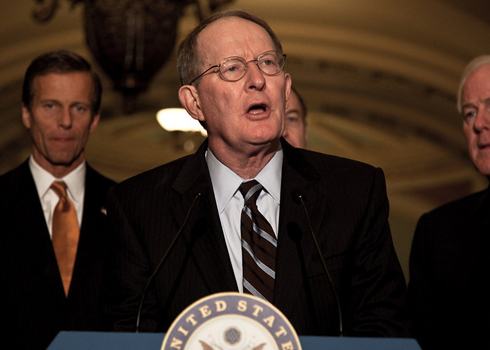Be careful what you wish for, progressive filibuster reform advocates. Sen. Lamar Alexander (R-TN) says the proposed changes to the filibuster pushed by Democrats like Sen. Tom Udall (NM) would make it possible for a legislative “freight train” to run unfettered through the Senate — one that Democrats facing a tough election in 2012 may not like.
“They better be careful, because the freight train could be the Tea Party Express,” Alexander told reporters today.
Alexander stopped by the conservative Heritage Foundation this afternoon to talk up the filibuster — and scare the daylights out of anyone who’d dare try to change it.
[TPM SLIDESHOW: Block That Bill! A History Of The Filibuster]
Alexander says the filibuster as it exists today is so fundamental to the Senate that to alter it would be to change the Senate into that most uncivilized of legislative halls: the House. He went after Democrats who are trying to use the first day of the legislative calendar (the only one on which they can easily change the rules of the Senate) to push through rules that would make it “easier to do with every piece of legislation what they did with the health care bill: ram it through on a partisan vote, with little debate, amendment, or committee consideration, and without listening to minority voices.”
From the prepared version of Alexander’s speech, which he stuck closely to at the Heritage event today:
The brazenness of this proposed action is that Democrats are proposing to use the very tactics that in the past almost every Democratic leader has denounced, including President Obama and Vice President Biden, who has said that it is “a naked power grab” and destructive of the Senate as a protector of minority rights.
Changing the way the filibuster works, he said, amounts to Democrats changing the rules of the game after the Republicans grew their numbers in November.
“This is called election nullification,” Alexander said of the Democratic proposals to reform the filibuster.
Alexander broke down his opposition to the proposed filibuster plan along two lines: first, he appealed to the kinder, gentler days of Senates gone by when, he said, leaders would force cooperation by using the rules in a way that emphasized the Senate’s natural predilection for “consensus.”
Second, he told Democrats that whatever they do to the filibuster now will come back to haunt them in a future Congress where they may again be in the minority.
To the first point, Alexander acknowledged that things have broken down recently in the Senate, but he dismissed the suggestion from progressives and Democrats that the breakdown came from a GOP caucus that put up an unprecedented number of legislative blockades since 2009.
But the demise of the Senate is not because Republicans seek to filibuster. The real obstructionists have been the Democratic majority which, for an unprecedented number of times, used their majority advantage to limit debate, not to allow amendments and to bypass the normal committee consideration of legislation.
To the second point — the fear factor — Alexander made it clear that Republicans will remember any Democratic changes to the legislative process and will exact their revenge if and when they retake the majority.
[S]uch a brazen power grab by Democrats this year will surely guarantee a similar action by Republicans in two years if Republicans gain control of the Senate as many believe is likely to happen.
(Alexander isn’t the only Republican warning about filibuster reform on the eve of the next Congress. In an op-ed scheduled to be published in the Washington Post tomorrow, Minority Leader Mitch McConnell — who expertly wielded his minority power to shut down many Democratic bills in the last Congress — calls filibuster reform “a power grab that Democrats should avoid.”)
The Tennessee Senator has a plan for fixing what’s broken in the Senate: turn back the clock. Alexander said that if Democrats will allow whatever amendments the Republicans suggest to be debated and voted on when a given piece of legislation comes up, “90 percent” of bills brought up would go through.
Alexander said that “a major reason why the majority cuts off amendments and debate is because Democratic members don’t want to vote on controversial issues.” Of course, there’s good reason for that: the GOP minority liked to use amendments to write campaign ad scripts.
Alexander has other reform ideas (e.g. ending the Senate’s “three-day work week” that keeps the body from holding many votes on Fridays.) These schemes worked in the ’70s and ’80s under majority leaders like Howard Baker (R-TN) and Robert Byrd (D-WV) and they could work again today, Alexander said.
After the speech, Alexander said a little retro behavior was about to be forced on the Democratic majority in the Senate whether it likes it or not. That alone could change the way the filibuster works, turning back the clock to a happier time when the Senate was actually known for doing things like passing laws.
“The last two years were an aberration thanks to the Democratic majority size,” Alexander said. “There was no incentive for the majority to work with Republicans, and they didn’t.”









